 W
WApache OpenOffice (AOO) is an open-source office productivity software suite. It is one of the successor projects of OpenOffice.org and the designated successor of IBM Lotus Symphony. It is a close cousin of LibreOffice and NeoOffice. It contains a word processor (Writer), a spreadsheet (Calc), a presentation application (Impress), a drawing application (Draw), a formula editor (Math), and a database management application (Base).
 W
WARIS Express is a free-of-charge modeling tool for business process analysis and management. It supports different modeling notations such as BPMN 2, Event-driven Process Chains (EPC), Organizational charts, process landscapes, whiteboards, etc. ARIS Express was initially developed by IDS Scheer, which was bought by Software AG in December 2010. The tool is provided as freeware on the ARIS Community webpage. ARIS Express is notable - having been mentioned in research published by Schumm, Garcia, Krumnow and Greenwood amongst others.
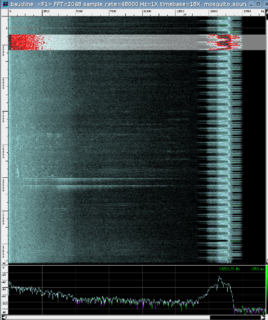 W
WThe baudline time-frequency browser is a signal analysis tool designed for scientific visualization. It runs on several Unix-like operating systems under the X Window System. Baudline is useful for real-time spectral monitoring, collected signals analysis, generating test signals, making distortion measurements, and playing back audio files.
 W
WA Beowulf cluster is a computer cluster of what are normally identical, commodity-grade computers networked into a small local area network with libraries and programs installed which allow processing to be shared among them. The result is a high-performance parallel computing cluster from inexpensive personal computer hardware.
 W
WBusyBox is a software suite that provides several Unix utilities in a single executable file. It runs in a variety of POSIX environments such as Linux, Android, and FreeBSD, although many of the tools it provides are designed to work with interfaces provided by the Linux kernel. It was specifically created for embedded operating systems with very limited resources. The authors dubbed it "The Swiss Army knife of Embedded Linux", as the single executable replaces basic functions of more than 300 common commands. It is released as free software under the terms of the GNU General Public License, version 2.
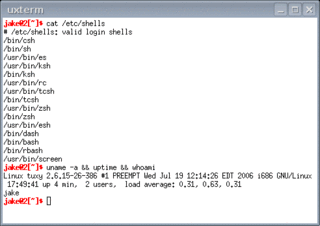 W
Wclear is a computer operating system command which is used to bring the command line on top of the computer terminal. It is available in various Unix shells on Unix and Unix-like operating systems as well as on other systems such as KolibriOS.
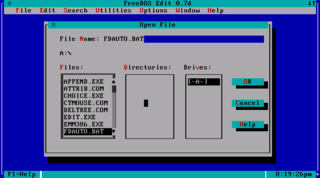 W
WA console application is a program designed to be used via a text-only computer interface, such as a text terminal, the command line interface of some operating systems or the text-based interface included with most Graphical User Interface (GUI) operating systems, such as the Win32 console in Microsoft Windows, the Terminal in macOS, and xterm in Unix. A user typically interacts with a console application using only a keyboard and display screen, as opposed to GUI applications, which normally require the use of a mouse or other pointing device. Many console applications such as command line interpreters are command line tools, but numerous text-based user interface (TUI) programs also exist.
 W
Wcowsay is a program that generates ASCII pictures of a cow with a message. It can also generate pictures using pre-made images of other animals, such as Tux the Penguin, the Linux mascot. It is written in Perl. There is also a related program called cowthink, with cows with thought bubbles rather than speech bubbles. .cow files for cowsay exist which are able to produce different variants of "cows", with different kinds of "eyes", and so forth. It is sometimes used on IRC, desktop screenshots, and in software documentation. It is more or less a joke within hacker culture, but has been around long enough that its use is rather widespread. In 2007, it was highlighted as a Debian package of the day.
 W
Wcurses is a terminal control library for Unix-like systems, enabling the construction of text user interface (TUI) applications.
 W
WDia is free and open source general-purpose diagramming software, developed originally by Alexander Larsson. Dia uses a controlled single document interface (SDI) similar to GIMP and Inkscape.
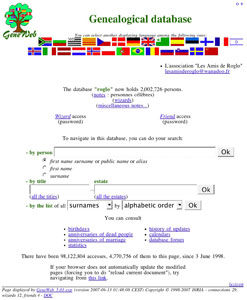 W
WGeneWeb is a free multi-platform genealogy software tool created and owned by Daniel de Rauglaudre of INRIA. GeneWeb is accessed by a Web browser, either off-line or as a server in a Web environment. It uses very efficient techniques of relationship and consanguinity computing, developed in collaboration with Didier Rémy, research director at INRIA. GeneWeb is used as the engine for several public genealogy websites, including Geneanet, a collection of inter-searchable genealogical databases currently containing references to more than 225 million persons.
 W
WGNU Screen is a terminal multiplexer, a software application that can be used to multiplex several virtual consoles, allowing a user to access multiple separate login sessions inside a single terminal window, or detach and reattach sessions from a terminal. It is useful for dealing with multiple programs from a command line interface, and for separating programs from the session of the Unix shell that started the program, particularly so a remote process continues running even when the user is disconnected.
 W
WGNU Units is a cross-platform computer program for conversion of units of quantities. It has a database of measurement units, including esoteric and historical units. This for instance allows conversion of velocities specified in furlongs per fortnight, and pressures specified in tons per acre. Output units are checked for consistency with the input, allowing verification of conversion of complex expressions.
 W
WgPhoto is a set of software applications and libraries for use in digital photography. gPhoto supports not just retrieving of images from camera devices, but also upload and remote controlled configuration and capture, depending on whether the camera supports those features.
 W
WGpsDrive is a computer program designed to act as a vehicle navigation system. The program displays its user's position, obtained from an NMEA-capable GPS receiver, on a zoomable map drawn on a computer screen. The map file is automatically selected depending on the position and preferred scale.
 W
WHylaFAX is the leading fax server for Unix-like computer systems. It uses a client-server design and supports the sending and receiving of faxes as well as text pages, on any scale from low to very high volumes, if necessary making use of large numbers of modems. It is open-source, free software and can be used commercially without charge.
 W
WInfo is a software utility which forms a hypertextual, multipage documentation and help viewer working on a command line interface.
 W
WIspell is a spelling checker for Unix that supports most Western languages. It offers several interfaces, including a programmatic interface for use by editors such as Emacs. Unlike GNU Aspell, ispell will only suggest corrections that are based on a Damerau–Levenshtein distance of 1; it will not attempt to guess more distant corrections based on English pronunciation rules.
 W
WIn computing, Kannel is an open-source WAP gateway. It provides the essential part of the WAP infrastructure as open source software to everyone so that the market potential for WAP services, both from wireless operators and specialized service providers, will be realized as efficiently as possible.
 W
WLibreOffice is a free and open-source office suite, a project of The Document Foundation. It was forked in 2010 from OpenOffice.org, which was an open-sourced version of the earlier StarOffice. The LibreOffice suite consists of programs for word processing, creating and editing of spreadsheets, slideshows, diagrams and drawings, working with databases, and composing mathematical formulae. It is available in 115 languages.
 W
WLinter SQL RDBMS is the main product of RELEX Group. Linter is a Russian DBMS compliant with the SQL:2003 standard and supporting the majority of operating systems, among them Windows, various versions of Unix, QNX, and others. The system enables transparent interaction between the client applications and the database server functioning in different hardware and software environments. DBMS Linter includes program interfaces for the majority of popular development tools. The system provides a high data security level allowing the user to work with secret information. Linter is the only DBMS certified by FSTEC of Russia as compliant with Class 2 data security requirements and Level 2 of undeclared feature absence control. For many years Linter has been used by Russian Ministry of Defense, Ministry of Foreign Affairs and other government bodies.
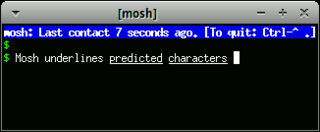 W
WIn computing, Mosh is a tool used to connect from a client computer to a server over the Internet, to run a remote terminal. Mosh is similar to SSH, with additional features meant to improve usability for mobile users. The major features are:Mosh maintains its session even when "roams", for example by moving to a different Wi-Fi network or when changing from Wi-Fi to 3G. Mosh maintains the terminal session even when a user loses their Internet connection or puts their client to "sleep." In comparison, SSH can lose its connection in such cases because TCP times out. Mosh client attempts to be responsive to keyboard events without waiting for network lag. It uses an adaptive system that predicts whether the application running on the server will decide to echo the user's keystrokes or deletions.
 W
WOpenOffice.org (OOo), commonly known as OpenOffice, is a discontinued open-source office suite. It was an open-sourced version of the earlier StarOffice, which Sun Microsystems acquired in 1999 for internal use.
 W
WPicospan was a popular computer conferencing tool written by Marcus D. Watts for the Altos 68000. It was written in 1983, for the most famous and popular computer conferencing system at that time, called M-Net, which was owned and operated by Mike Myers. Sometime in 1984, Marcus's employer, an Ann Arbor company called Network Technologies International (NETI) purchased the rights for PicoSpan planning to develop it into a commercial product called E-Forum.
 W
Wplan is a calendar and day planner program for the X Window System based on the Motif widget set. plan is free software released under a custom permissive license.
 W
WPolkit is a component for controlling system-wide privileges in Unix-like operating systems. It provides an organized way for non-privileged processes to communicate with privileged ones. Polkit allows a level of control of centralized system policy. It is developed and maintained by David Zeuthen from Red Hat and hosted by the freedesktop.org project. It is published as free software under the terms of version 2 of the GNU Lesser General Public License.
 W
WIn computing, redirection is a form of interprocess communication, and is a function common to most command-line interpreters, including the various Unix shells that can redirect standard streams to user-specified locations.
 W
WScript Creation Utility for Maniac Mansion Virtual Machine (ScummVM) is a set of game engine recreations. Originally designed to play LucasArts adventure games that use the SCUMM system, it also supports a variety of non-SCUMM games by companies like Revolution Software and Adventure Soft. It was originally written by Ludvig Strigeus. Released under the terms of the GNU General Public License, ScummVM is free software.
 W
WIn computing, spooling is a specialized form of multi-programming for the purpose of copying data between different devices. In contemporary systems, it is usually used for mediating between a computer application and a slow peripheral, such as a printer. Spooling allows programs to "hand off" work to be done by the peripheral and then proceed to other tasks, or to not begin until input has been transcribed. A dedicated program, the spooler, maintains an orderly sequence of jobs for the peripheral and feeds it data at its own rate. Conversely, for slow input peripherals, such as a card reader, a spooler can maintain a sequence of computational jobs waiting for data, starting each job when all of the relevant input is available; see batch processing. The spool itself refers to the sequence of jobs, or the storage area where they are held. In many cases the spooler is able to drive devices at their full rated speed with minimal impact on other processing.
 W
WTerminfo is a library and database that enables programs to use display terminals in a device-independent manner. Mark Horton implemented the first terminfo library in 1981–1982 as an improvement over termcap. The improvements includefaster access to stored terminal descriptions, longer, more understandable names for terminal capabilities and general expression evaluation for strings sent to the terminal.
 W
Wtmux is an open-source terminal multiplexer for Unix-like operating systems. It allows multiple terminal sessions to be accessed simultaneously in a single window. It is useful for running more than one command-line program at the same time. It can also be used to detach processes from their controlling terminals, allowing remote sessions to remain active without being visible.
 W
Wttyrec is a program or its file format capable of recording the TTY output of a text-mode program together with timestamps and then replaying it.
 W
WUlteo Open Virtual Desktop (OVD) was an open-source Application Delivery and Virtual Desktop infrastructure project that could deliver applications or a desktop hosted on a Linux or Windows server to end users. It was an open source alternative to Citrix and VMware solutions and was, as of June 2012, the only presentation virtualization solution supporting both Linux and Windows applications. It was created by Gaël Duval, who previously created Mandriva Linux. The software seems to be withdrawn, website is unavailable.
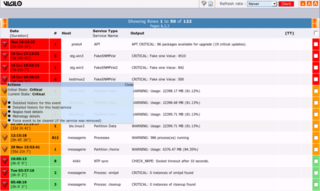 W
WVigilo NMS is a monitoring software capable of handling large-scale heterogeneous systems thanks to a distributed and modular architecture. Built around Nagios, Vigilo additionally manages metrology, mapping, correlation and reporting.
 W
WyEd is a general-purpose diagramming program with a multi-document interface.
 W
WZekr (Arabic:ذكر) is an open source Quranic desktop application. It is an open platform Quran study tool for browsing and researching on the Quran. Zekr is a Quran-based project, planned to be a universal, open source, and cross-platform application to perform most of the usual refers to the Quran, according to the project website. Zekr is included in the default installation of Sabily Linux distribution.